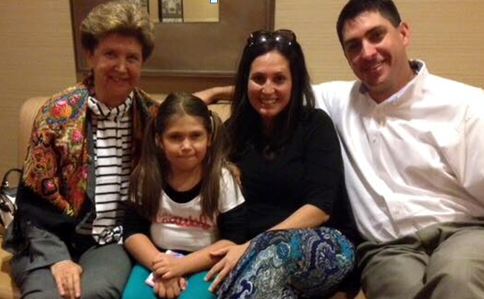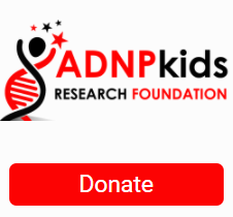SUMMARY: A detailed developmental case study of the current most prevalent ADNP mutation p.Tyr719*. A story focused on one child, Alexi's 8.5 year journey to diagnosis and new found hope for improving diagnostic procedures, pheyotypic scope and interventions.
PRESS RELEASE - MARCH 22, 2017
DETAILED DEVELOPMENTAL CASE STUDY OF MOST PREVENT ADNP MUTATION: P.TRY719* A STOP MUTATION IN ADNP.
A STORY FOCUSED ON ALEXI'S FIGHT AND TRIUMPHS OVER WALKING AND COGNITIVE DISABILITIES:
Activity-dependent neuroprotective protein (ADNP), discovered at the laboratory of Professor Illana Gozes, the Lily and Avraham Gildor Chair for the Investigation of Growth Factors, Director of the Elton Laboratory for Molecular Neuroendocrinology at Tel Aviv University, is one of the most prevalent de novo mutated genes in syndromic autism spectrum disorders, driving a general interest in the gene and the ADNP syndrome (aka Helsmoortel Van Der Aa). The most prevalent mutation in ADNP to-date (ADNP p.Tyr719*, spanning about 20% of more than 100 cases currently diagnosed and grouped on a closed Facebook page as well as in a genetic registry – Sandra Bedrosian-Sermone, Dr. Anke Van Dijck and Prof. Frank Kooy, co-authors) results in one copy of a shorter protein (with about a third of the protein missing). The mutation is heterozygous, namely, one protein is intact. Alexi’s story, just published in Frontiers in Endocrinology (http://journal.frontiersin.org/article/10.3389/fendo.2017.00107/full) and led by Professor Illana Gozes, is a comprehensive case study told by parents (Angela Zawacki-Downing co-author), basic scientists and clinicians, in a collaborative fashion toward better understanding of 1] diagnostic procedures, 2] phenotypic scope, and 3] clinical trials design and interventions.
“Alexi Sienna Downing (currently 11-year-old) had several rare congenital anomalies including imperforate anus that was surgically repaired at two days of age. Her findings were craniofacial asymmetries, global developmental delay, autistic-behaviors (loss of smile and inability to make eye contact at the age of 15 months) and slow thriving as she gradually matures. Comprehensive diagnostic procedures at 3 years resulted in no definitive diagnosis. With parental persistence, Alexi began walking at 3.5 years (skipping crawling). At the age of 8.5 years, Alexi was subjected to whole exome sequencing, compared to the parents and diagnosed as carrying an ADNP p.Tyr719* mutation, a causal recurring mutation in ADNP. Brain magnetic resonance imaging (MRI) demonstrated mild generalized cerebral volume loss with reduced posterior white matter. Alexi is nonverbal, communicating with signs and word approximations. She continues to make slow but forward developmental progress, and her case teaches newly diagnosed children within the ADNP kids Research Foundation (http://www.adnpfoundation.org/). This case study emphasizes the importance of diagnosis and describes, for the first time, early motor intervention therapies. Detailed developmental profile of selected cases leads to better treatments.”
From a clinical development point of view, we strive to have tailored drugs to treat the children, early enough to avoid compounding developmental delays. In this respect, the Gozes team discovered and pushed forward the development of NAP (NAPVSIPQ), the shortest active snippet of ADNP. NAP increases ADNP’s activity of cellular and brain protection protection as well as synaptic plasticity and learning and memory. NAP, also called davunetide, has shown activity in clinical trials. It increased cognitive scores in a Phase IIa clinical trial in patients suffering from amnestic mild cognitive impairment (aMCI) and protected functional daily activities as well as brain cellular activity (measured by magnetic resonance imaging), in schizophrenia patients, exhibiting safety and bioavailability. Clinical studies in the ADNP syndrome are currently planned with NAP – now called CP201 (Coronis Neurosciences, http://www.coronisns.com/, Professor Gozes, Chief Scientific Officer).
Citation:
Gozes I, Patterson MC, Van Dijck A, Kooy RF, Peeden JN, Eichenberger JA, Zawacki-Downing A and Bedrosian-Sermone S (2017) The Eight and a Half Year Journey of Undiagnosed AD: Gene Sequencing and Funding of Advanced Genetic Testing Has Led to Hope and New Beginnings. Front. Endocrinol. 8:107. doi: 10.3389/fendo.2017.00107
DETAILED DEVELOPMENTAL CASE STUDY OF MOST PREVENT ADNP MUTATION: P.TRY719* A STOP MUTATION IN ADNP.
A STORY FOCUSED ON ALEXI'S FIGHT AND TRIUMPHS OVER WALKING AND COGNITIVE DISABILITIES:
Activity-dependent neuroprotective protein (ADNP), discovered at the laboratory of Professor Illana Gozes, the Lily and Avraham Gildor Chair for the Investigation of Growth Factors, Director of the Elton Laboratory for Molecular Neuroendocrinology at Tel Aviv University, is one of the most prevalent de novo mutated genes in syndromic autism spectrum disorders, driving a general interest in the gene and the ADNP syndrome (aka Helsmoortel Van Der Aa). The most prevalent mutation in ADNP to-date (ADNP p.Tyr719*, spanning about 20% of more than 100 cases currently diagnosed and grouped on a closed Facebook page as well as in a genetic registry – Sandra Bedrosian-Sermone, Dr. Anke Van Dijck and Prof. Frank Kooy, co-authors) results in one copy of a shorter protein (with about a third of the protein missing). The mutation is heterozygous, namely, one protein is intact. Alexi’s story, just published in Frontiers in Endocrinology (http://journal.frontiersin.org/article/10.3389/fendo.2017.00107/full) and led by Professor Illana Gozes, is a comprehensive case study told by parents (Angela Zawacki-Downing co-author), basic scientists and clinicians, in a collaborative fashion toward better understanding of 1] diagnostic procedures, 2] phenotypic scope, and 3] clinical trials design and interventions.
“Alexi Sienna Downing (currently 11-year-old) had several rare congenital anomalies including imperforate anus that was surgically repaired at two days of age. Her findings were craniofacial asymmetries, global developmental delay, autistic-behaviors (loss of smile and inability to make eye contact at the age of 15 months) and slow thriving as she gradually matures. Comprehensive diagnostic procedures at 3 years resulted in no definitive diagnosis. With parental persistence, Alexi began walking at 3.5 years (skipping crawling). At the age of 8.5 years, Alexi was subjected to whole exome sequencing, compared to the parents and diagnosed as carrying an ADNP p.Tyr719* mutation, a causal recurring mutation in ADNP. Brain magnetic resonance imaging (MRI) demonstrated mild generalized cerebral volume loss with reduced posterior white matter. Alexi is nonverbal, communicating with signs and word approximations. She continues to make slow but forward developmental progress, and her case teaches newly diagnosed children within the ADNP kids Research Foundation (http://www.adnpfoundation.org/). This case study emphasizes the importance of diagnosis and describes, for the first time, early motor intervention therapies. Detailed developmental profile of selected cases leads to better treatments.”
From a clinical development point of view, we strive to have tailored drugs to treat the children, early enough to avoid compounding developmental delays. In this respect, the Gozes team discovered and pushed forward the development of NAP (NAPVSIPQ), the shortest active snippet of ADNP. NAP increases ADNP’s activity of cellular and brain protection protection as well as synaptic plasticity and learning and memory. NAP, also called davunetide, has shown activity in clinical trials. It increased cognitive scores in a Phase IIa clinical trial in patients suffering from amnestic mild cognitive impairment (aMCI) and protected functional daily activities as well as brain cellular activity (measured by magnetic resonance imaging), in schizophrenia patients, exhibiting safety and bioavailability. Clinical studies in the ADNP syndrome are currently planned with NAP – now called CP201 (Coronis Neurosciences, http://www.coronisns.com/, Professor Gozes, Chief Scientific Officer).
Citation:
Gozes I, Patterson MC, Van Dijck A, Kooy RF, Peeden JN, Eichenberger JA, Zawacki-Downing A and Bedrosian-Sermone S (2017) The Eight and a Half Year Journey of Undiagnosed AD: Gene Sequencing and Funding of Advanced Genetic Testing Has Led to Hope and New Beginnings. Front. Endocrinol. 8:107. doi: 10.3389/fendo.2017.00107


